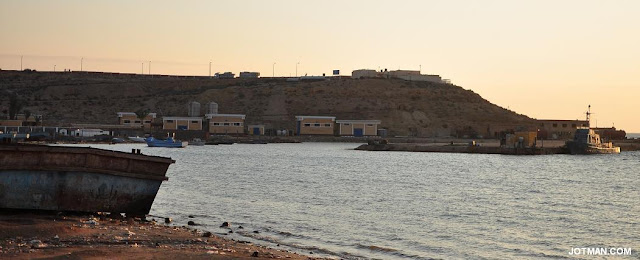At this moment, foreign correspondents from around the word are headed for the town of Salloum (sometimes spelt Saloum or Salloom). Apparently, at this hour, the Libyans have abandoned checkpoints on the other side of Egypt's Salloum border check point, and anyone can enter the country.
A little over a year ago, I made a journey to this outpost in the Sahara desert. I'm posting an exerpt from my travel journal and some photos I took. One thing that anyone headed for Libya by way of Egypt needs to keep in mind is that the border is heavily mined. So if you don't pass into Libya via the checkpoint at Salloum, you may be taking a very big risk.
First entry in Jotman's journal:
Few things depress me more than the sight of new seaside holiday resort towns on the coast of the Mediterranian. The coast of Egypt is one private resort after another. Blocks of 16 unit towers, names like Maadii, Marassi, Al-Karma, Emirate Hights. A resort called "Marina" stretched for miles and miles. One of the classiest resorts was called "Armed forces resort."Here's my photo of the Armed Forces Resort. It gives you an indication of the power of the army in Egyptian society, something that Egypt's pro-democracy movement may yet have to confront.
 |
| This Egyptian Armed Forces resort appeared the most luxurious of the many resorts I passed. |
My travel diary continued:
"Saloom" read a sign by the road. We arrived at a checkpoint. They asked for passports.There's one hotel in the town. Simple, but clean. Overpriced, but given the lack of choice, that was to be expected. Someone on the bus showed me to it.
"Do you speak Arabic?"
"No, sorry."
"Why are you in Saloom?"
I was wondering if they would understand the truth: would they understand if I said I just wanted to see what's here? Probably not.
"I heard it is a beautiful place."
"No it is not." Both the guards were shaking their heads.
They escorted me off the bus into a room under the gateway. One man was seated at a desk. I walked in and shook his hand.
"Where from?"
"I came from Cairo."
I took out guidebooks, showed them on the map. Back on the bus, the beduin gathered around. No longer was I the anonymous foreigner. I took a photo of one of the men. Another made a long face. So I took a picture of him too. Smiles.
 |
| The border checkpoints are up on the ridge. Somewhere offshore lies a sunken Italian submarine. |
 |
| Libya lies on the other side of the ridge. |
My travel journal continued:
Rising shortly before sunrise, I walked aroudn Salloum. My guidebook had said that the town of Salloum is located on top of the ridge. It is not. The border station is on a point above a small harbor where a navy frigate was docked. The border installation was large. The border runs along a ridge high above the seaside town, extending into the desert. The desert along the border is said to be mined. I drank coffee waiting for the 9am bus back to Marsa Matruth.The only taxis in Salloum are donkey-carts. This photo depicts my early morning dash through town to the bus station.
 |
| Eco-friendly Salloum taxi service. |
Back on the bus...
Good Bye read the sign on the border gate I had passed through late at night. Another reception party at the checkpoint: a group of plain clothed guards. I was escorted off the bus. Examining my passport, they asked "where is your stamp from Libya?"
"I didn't go to Libya."
"Just Salloum?!"





